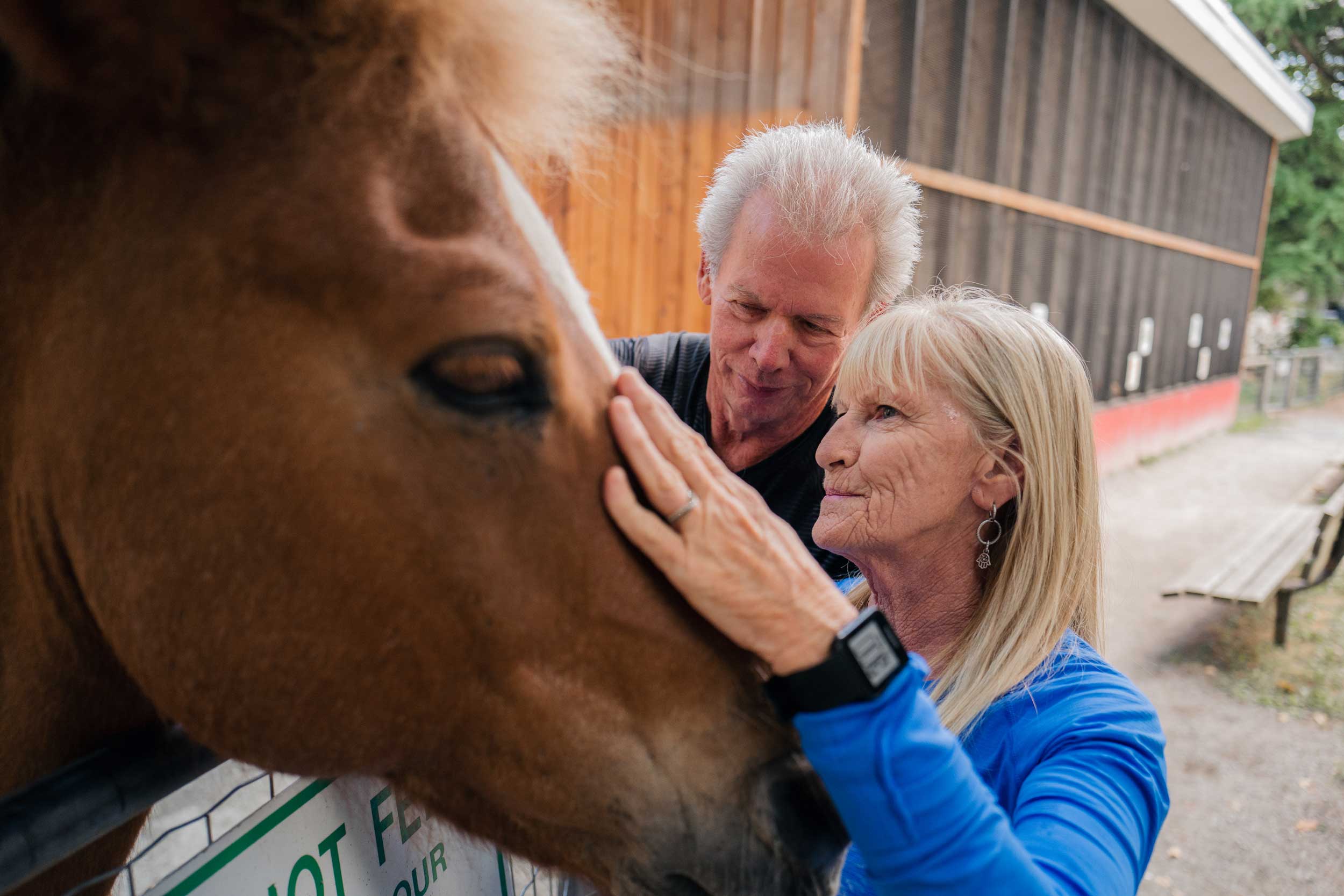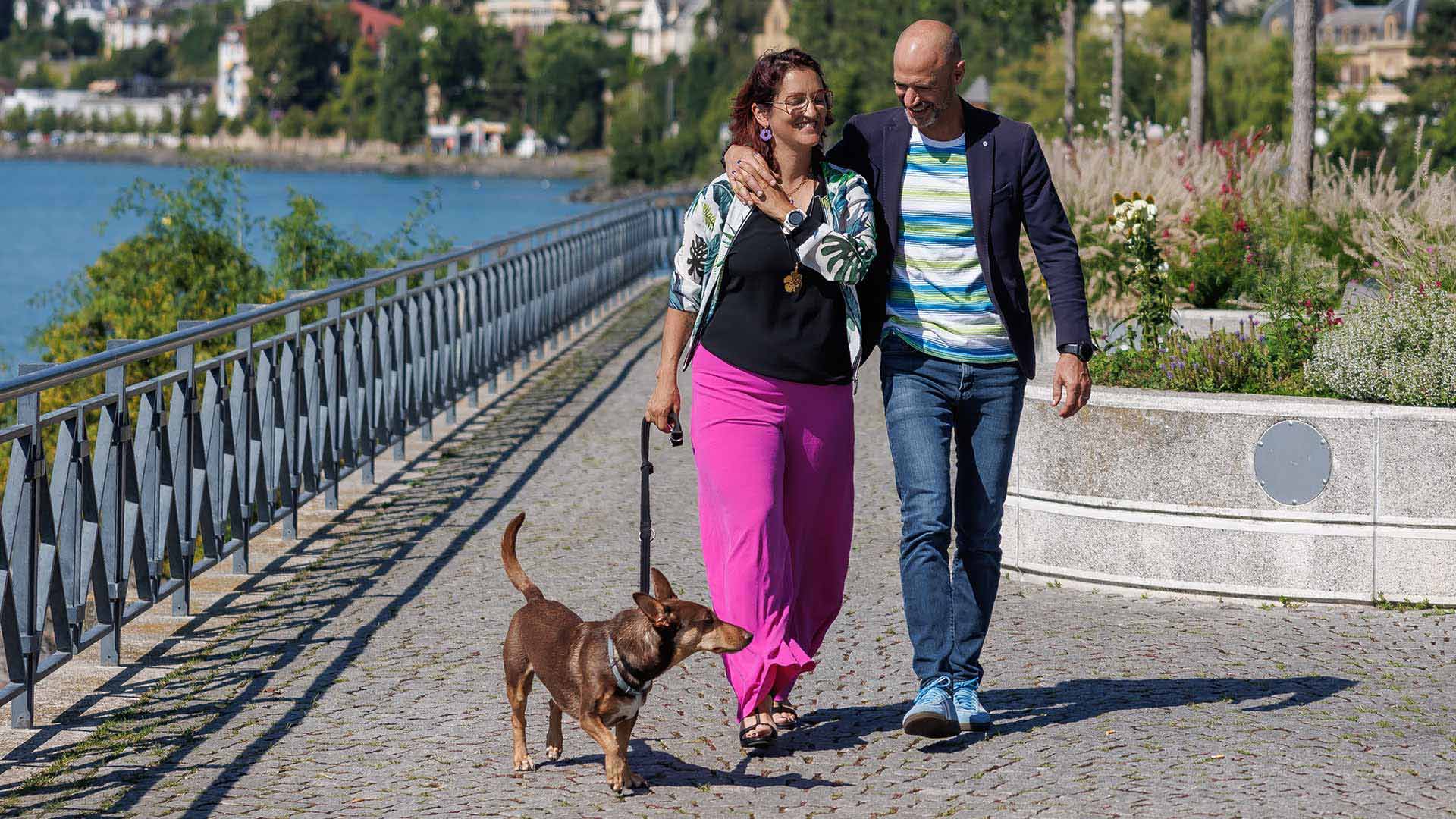Kathy, surrounded by her husband, Scott, and great nephew Kale, says her love of the outdoors hasn’t gone away since having melanoma. "But I'm a lot smarter than I was before my diagnosis. I don't go out in peak sun hours, I lather up with sunscreen, and wear hats and sunglasses."
'It became a competition for me'
Kathy likes to win, and she’s had practice: she's been an athlete nearly all her life, playing soccer, hockey, golf, and most of all, softball. When one softball league wasn’t enough, she’d play in two or three at a time. She competed in the World Masters Games three times. A coach, too, she was the first woman to lead a team in the Little League World Series, representing Canada in 1993.
So when she was diagnosed with malignant metastatic melanoma in 2003, it became the highest-stakes game of her life. The treatment options for melanoma patients at the time were slim.
“It was like I got thrown in a tumble dryer,” she said.
Everything changed, practically overnight. She had to take leave from her job as a motorist insurance manager; her playing in sports was upended. But Kathy was able to keep one piece of her previous life with her: she would coach a girls’ softball team, appropriately named the Survivors, once weekly while undergoing treatment.
“I knew that those kids, and the energy from those kids, would help keep me going,” she said. “The only things that got me out of bed were to go to the bathroom and to go see those girls.”
Kathy still finds herself on the softball diamond, though she has stopped playing competitively. A close look at the logo of the Save Your Skin Foundation shows one of Kathy’s softball-era injuries: a broken pinkie in the handprint.
A lifelong sun worshipper
It was Kathy’s niece who urged her to have a mole on her back checked out by a dermatologist in 2002. Kathy had lost her father to cancer when she was younger, and another family member had just been diagnosed with melanoma. Her niece was worried given Kathy’s habits.
Kathy always preferred a tanner complexion, as opposed to the naturally fair skin of her Scottish heritage. She spent as much time as she possibly could out in the sun. She’d used at-home tanning lights when she was a teenager, and she would frequent the tanning bed at her local gym.
“I spent my whole life trying to change my skin tone,” she said. “I had an obsession with it.”
A new obsession: Fighting cancer
Now, Kathy’s obsession was fighting cancer. In 2005, it returned, having spread across one of her lungs and other vital organs. She overheard nurses telling one another that they didn’t think she would make it. She began what was then an investigational treatment – the fifth Canadian to ever undergo it.
“Well,” she said, “I was like, ‘Bring it'."
The effects of the therapy were crushing. Some days were especially hard, and “there were times I thought I would give up,” she said.
On one of those more difficult days, because all great stories have an escape scene, Kathy left the hospital in search of a hamburger.
“All I wanted was to go for a hamburger. I don’t think I even had shoes on,” she laughed, “and once I took a look at that hamburger, I threw up.”
Inside her body, though, the tumors were responding to the treatment.
“They had never seen such a quick response,” she said.
Subscribe to Our stories alerts
Beyond just relevant information about Bristol Myers Squibb's therapeutic areas and innovation, Our stories offer a window into the work our employees do every day for patients.
What to know about melanoma:
- Melanoma is a form of skin cancer characterized by the uncontrolled growth of pigment-producing cells, called melanocytes, in the skin.
- An estimated 324,600 new melanoma cases are diagnosed globally each year.
- Melanoma represents 1.7% of the estimated 19 million new cancer cases worldwide each year.
- In most regions of the world, melanoma occurs more frequently in men than in women.
- Around 10% of all people with melanoma have a family history of the disease.
Kathy, Scott and their golden retriever Tucker find shade in one of their favorite spots, a creek alongside Maplewood Farm. Kathy and her family visited her “place of peace” nearly every day of the 30 years they lived in North Vancouver.
Kathy was able to return home, but not to her old self.
In 2007, the cancer was back again, in her small intestine. Fortunately, Kathy was eligible for a new investigational treatment with a more manageable infusion schedule. She finished the treatment that same year and continues to be scanned on an annual basis.
'Helping patients live their best lives’
Since becoming a patient, Kathy has worked tirelessly to help change the game for skin cancer prevention and care. In 2006 – amid the relapse and after she was given a terminal diagnosis – she and her family started the Save Your Skin Foundation (SYSF), a nonprofit dedicated to fighting melanoma and non-melanoma skin cancers through education and advocacy.
Familiar faces from Kathy’s patient journey now work for the Foundation: some of the girls from the Survivors softball team, now grown, are on the SYSF board; one of them is the Foundation’s accountant. Both of her nieces, including the one who pushed Kathy to have her skin checked, work for the nonprofit.
“Everybody who comes through the door at Save Your Skin becomes part of my life, part of my family’s life,” Kathy said. She still carries the photographs of some of the first patients SYSF worked with: “I take them everywhere with me."
“Everything we do at Save Your Skin is influenced by my journey, my hurdles, my continued hurdles,” she said.
Kathy works to ensure those same hurdles are easier for other patients to overcome. She’ll walk families through getting the right support, in hospitals and doctor’s offices, but also and especially at home.
“I tell them to be very patient with each other, and how they’re all taking on a different piece of this challenge for their loved one.”
Prevention is equally important: last year, the Foundation partnered with medical students to launch an initiative that trains hair stylists to detect signs of skin cancer. And Kathy was a critical force behind legislation in Canada banning the use of tanning beds by children and teens. Much of her focus these days is on health policy reform.
Though Kathy’s treatments have concluded for now, her work is far from done – she’s pulling extra innings to help others.
"That’s at the center of what we do,” she said, “helping patients live their best lives and survive.”
Kathy and Scott sit together on a bench that was donated to Maplewood Farm in her honor when she was sick. On the bench reads, “Life is not measured by the breaths you take, but by the moments that take your breath away.”
Save Your Skin Foundation (SYSF) is a patient-led organization dedicated to the fight against non-melanoma skin cancers, melanoma, and ocular melanoma through nationwide education, advocacy, and awareness initiatives. Save Your Skin Foundation is committed to playing an active role in reducing the incidence of skin cancer in Canada, and to providing compassionate support for all Canadians living with skin cancers.
When you click on this link, new tabs or windows will open. We provide these links as a convenience. Bristol Myers Squibb is not responsible for, nor endorses, any content on third-party sites.
Tucker receives pets from Kathy’s sister, niece and great nephew on Ambleside Beach, where Kathy and Scott first went after she was diagnosed. “I remember us sitting there with a tea and coffee, trying to grasp what we’d just been told.”
About Bristol Myers Squibb
Bristol Myers Squibb is a global biopharmaceutical company whose mission is to discover, develop and deliver innovative medicines that help patients prevail over serious diseases. As global citizens, we work sustainably and responsibly to create a positive impact in the communities where we live and work.



